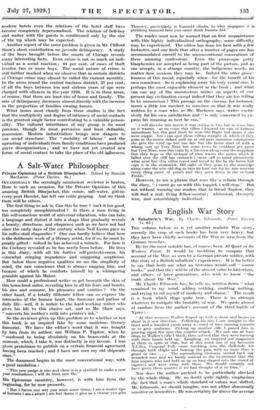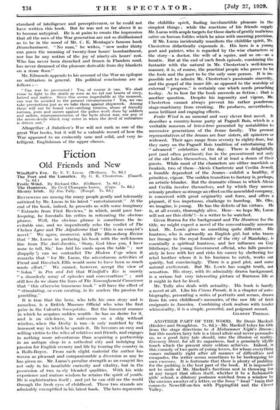An English War Story
THE volume before us is yet another realistic War story. recently the crop of such books has been very heavy, but they have been chiefly accounts of the War as seen from the German trenches.
By far the most notable has, of course, been All Quiet on the Western Front. It would be invidious to compare that account of the War, as seen by a German private soldier, with this story of a British subaltern's experiences. It is far better to say that both are what an historian would call " source books," and that they will be of the utmost value to historians, and others, of later generations, who wish to know " the truth about the War."
Mr. Charles Edmonds has, he tells us, written down " what remained in my mind, adding nothing, omitting nothing, and trying to rid myself of modesty and shame." The result is a book which rings quite true. There is no attempt whatever to mitigate the brutality of war. We quote almost at random from the author's account of the third battle of Ypres :—
" At that moment Walker leaped up with a shout and began to shoot in a new direction. Following his aim I saw straight to the front and a hundred yards away a crowd of men running towards us in grey uniforms. Picking up another rifle I joined him in pouring rapid fire into thiS counter-attack. We saw one at least drop, to Walker's rifle I think, then noticed that they were running with their hands held up. Laughing, we emptied our magazines at them in spite of that, but at this point one of my favourite N.C.O.s, Corporal Fell, came tumbling into the shell-hole, hit through both thighs and bearing tho pain with no more than a grunt or two. . . . The surrendering Germans carried back oaf wounded mon and we barely noticed in the excitement that the four snipers who had held us up so long slipped into the crowd of captives and went away with them. Wo should certainly not have given them quarter if we had thought of it in time."
Nor does the author pretend to be particularly shocked by the whole thing. He, no doubt quite rightly, emphasizes the fact that a man's whole standard of values was shifted. Mr. Edmonds, we should imagine, was not either abnormally sensitive or insensitiye. He was certainly far above the average
standard of intelligence and perceptiveness, or he could not have written this book. But he was not so far above it as to become untypical. He is at pains to create the impression that all the men of the War generation are not so disillusioned as to be in the mood of Mr. C. E. Montagu's famous book Disenchantment. "No man," he writes, "now under thirty can guess the meaning of twenty-four hours' bombardment, nor has he any notion of the joy of ninety-six hours' rest. Who has never been drenched and frozen in Flanders mud, has never dreamed of the pleasure derivable from dry blankets on a stone floor."
Mr. Edmonds appends to his account of the War an epilogue on militarism in general. His political conclusions are as follows
Can war be prevented ? Yes, of course it can. We shall cease to fight to the death so soon as we rid our hearts of envy, hatred and malice. Since this seems improbable at the moment, can war be avoided in the present circumstances ? Yes, we can take precautions just as we take them against shipwreck. Among these will not be found vote-catching treaties, abuse of friendly nations, jeers and sneers against the police work done by soldiers and sailors, misrepresentation of the facts about war, nor any of the seven-devils which may enter in when the devil of militarism is driven out."
Altogether A Subaltern's War will not rank as one of the great War books, but it will be a valuable record of how the War appeared to an eminently sane and solid, and very in- telligent, Englishman of the upper classes.



































 Previous page
Previous page